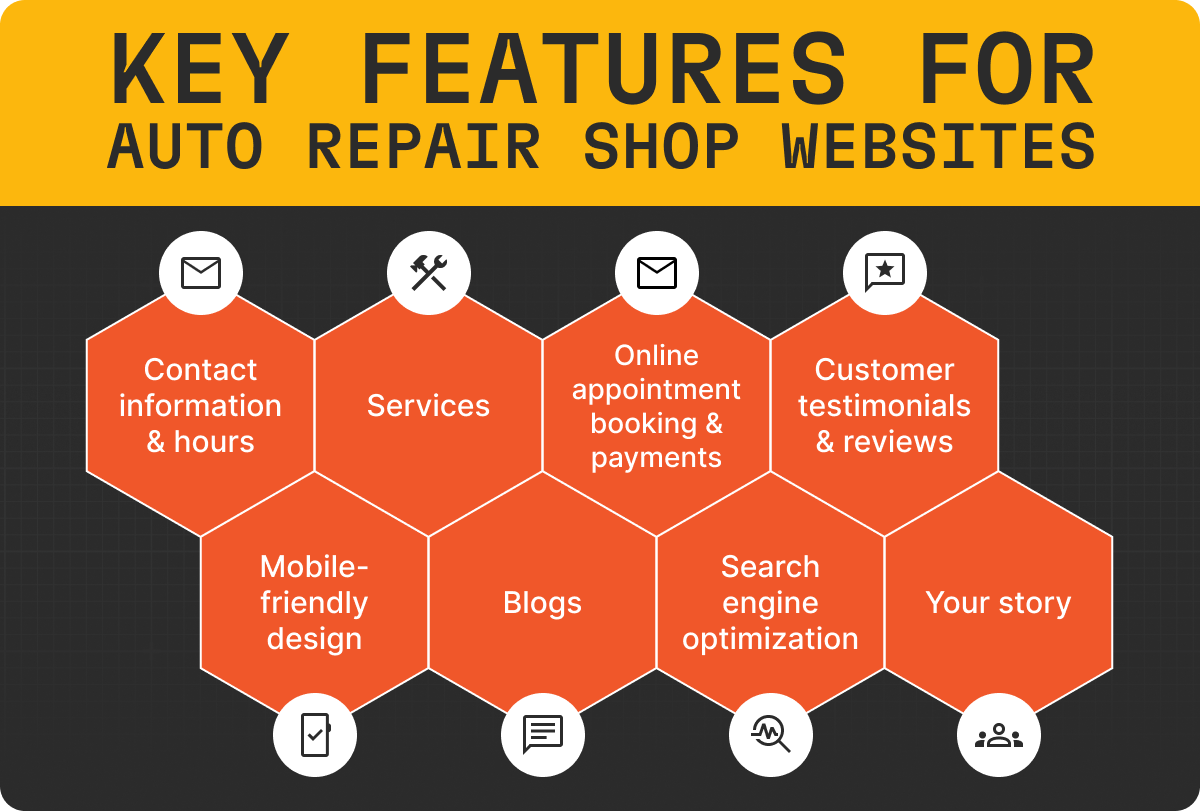1. Strategize With the Shop Owner
Shop owners are ultimately responsible for getting the shop off the ground, which includes hiring the team, deciding the direction of the business, and making smart financial investments. But during day-to-day operations, your service advisor responsibilities and the decisions you make will directly influence the shop’s rhythm as well as the culture of the team. Because shop owners call the shots, and you see the day-to-day impact of their decisions, the relationship that you have with your shop owner is ripe for collaboration.
As you delegate tasks based on priority and monitor your team’s performance, you might notice where there’s room for improvement. If you notice a technician’s productivity has significantly decreased one month after a steady flow, you can talk to the shop owner about setting up a one-on-one meeting with the technician to find the root cause of the dip and provide extra support for improvement.
You might also notice where systems and processes can be improved. In many cases, productivity gaps aren’t the result of individual employees but rather the result of inefficient ways of doing things. If you have a difficult time seeing the status of repairs or if you have to constantly leave your station to chase down a technician or a customer, a better shop management system can solve some of these problems.
In addition to streamlining your workflow, a good shop management system will also allow you and the shop owner to track and identify patterns. Tracking patterns can help you celebrate your shop’s wins and discover even more opportunities for shop growth. If you see that your shop met its sales goals for the quarter, for example, you could work together with the shop owner to plan an employee appreciation night.
As you and the shop owner collaborate to improve business operations and morale, the shop owner will gain more freedom to step away from the shop. When everyone at the shop knows what to do, and you know how to guide them, the shop owner can attend conferences, trade shows, and other networking events without having to worry; they know that you have everything under control. You will both have more time to grow and develop so that when the time comes for you and the shop owner to reassess strategy, you’ll be able to find even more opportunities to take the business to new heights.
2. Set Technicians Up for Success
Technician duties and service advisor responsibilities tend to overlap. You are both focused on inspections and repair orders, but you’re accountable for selling the work while technicians are responsible for identifying issues and getting them fixed. When it comes to setting technicians up for success, you’ll want to consider how you help them with the inspection process, how you relay their findings back to customers, and how you dispatch work to technicians.
It’s typically the technician’s job to run the inspection, but service advisors play a key role in handing off the inspection tasks. For example, if a customer comes into the shop concerned about a leak, you might prompt the technician to conduct a fluid inspection. One of your service advisor duties might even include creating vehicle inspection checklists that you can assign to technicians, helping them know exactly what parts of the vehicle to inspect.
After the technician completes the inspection, it’s now your turn to show the customer all the issues they found, write up an estimate, and sell the work. The more work you sell, the more work technicians have on their plates. And depending on how the shop pays service advisors and technicians, the more work you sell, the more money both of you make.
Once the work is sold, you can begin ordering parts and dispatching the jobs to one or multiple technicians. In many shops, ordering parts falls under service advisor responsibilities, but some shops hire a parts manager to help find and purchase parts as well as manage the shop’s inventory. If your shop has a parts manager, you will likely still be responsible for communicating with them, especially when you write the parts side of the estimate.
When you dispatch work, you want to be careful to distribute the work evenly among technicians so that no one technician feels overloaded or that they’re not getting enough work. You might even want to know which technicians specialize in certain repairs so that you can foster better collaboration among technicians.
One of your main service advisor responsibilities is to maintain harmony in the shop, so finding the balance between helping technicians and helping customers is the key to keeping the wrenches turning.
3. Educate & Empower Customers
Even though you work closely with the shop owner and technicians, the most important part of your service advisor duties is customer service. You will most likely be the first person every customer sees when they enter the shop, and the last person they see when they leave. After all, customers are the people who you are writing service for.
Every day at the shop, you’ll need to take customers through the inspection and estimate process. You’ll advise customers about the best route to take concerning their vehicle repairs based on their vehicles, budget, and the severity of the issues that the techs uncover. Many customers will have questions about their car and the services you’re suggesting. Practicing empathy is crucial to showing customers that you care about their concerns and their safety.
It’s important to meet customers where they’re at. Some of your customers will know a lot about their cars, others will not. Some customers appreciate a detailed explanation of how a certain issue might have occurred and how you plan on fixing it, and others may just want to hand over the keys and let you do your thing, no questions asked. A good service advisor knows how to read the situation. It never hurts to gently ask your customers if they’d like you to explain something to them.
Probably the most challenging but rewarding of all the service advisor responsibilities is building customer loyalty. With everything else going on, it can be easy to overlook how much little courtesies matter to customers. Just taking the time to ask them how their day is going or catching up about something they mentioned last time they came into the shop will make them feel better about being there. And let’s face it: most people dread getting their vehicles repaired. Adding a personal touch to each customer experience can go a long way toward creating a welcoming shop environment that customers actually want to tell their friends and family about.
4. Go the Extra Mile In Your Service Advisor Responsibilities With a Shop Management System
A cloud-based shop management system can be one of the most powerful tools in your tool belt as a service advisor. Using a shop management system makes it easier to build trust with customers, assist technicians, and collaborate with the shop owner to build a better shop.
With Tekmetric’s features and integrations, you can spend less time on menial tasks and focus on what really matters: growing with your team and providing the best possible service.
5. Investing in People and Systems
Change isn’t always easy, especially if you’re a service advisor at an auto repair shop with established processes and procedures. But as one of the primary members of the team who regularly switches between customer-facing and repair-facing roles, service advisors are often the best equipped to notice gaps in a shop’s processes and procedures.
In the same way that you might bring rusty tools to the shop owner’s attention and advocate for ordering a new set of tools, you might bring up the idea of investing in a shop management system to increase efficiency and streamline workflows.
We specifically designed Tekmetric’s features to be intuitive for our users. As you and your team use Tekmetric, you will have access to reports and resources that will help you refine the way you carry out your service writer responsibilities.
Inventory Table & Parts Reports
If you work at a shop where parts ordering and inventory management are considered service advisor responsibilities, parts management can become another task that takes you away from your team and your customers. To streamline parts and inventory management, we created an inventory table and a parts report.
Tekmetric’s inventory table lets you see exactly which parts your shop has in stock, and how many of each part you have. You can even view statuses to know when certain parts are running low so that you can order more before you run out. And with Parts Hub, you can order parts directly inside of Tekmetric without disrupting your workflow.
Tekmetric has two distinct parts reports: the Parts Purchased Report and the Parts Usage Report. Inventory management is a breeze when you can see exactly what parts sell well, which brands of parts your customers prefer, and which parts manufacturers your shop may want to avoid in the future due to repeated recalls or low inventory.
Labor Guide
Establishing accurate repair times shouldn’t be a guessing game nor should it take you away from your other service advisor duties. Tekmetric’s built-in Labor Guide makes it easy to find accurate labor times for repairs without having to leave Tekmetric. With VIN decoding, additional labor, and a wealth of labor times at your fingertips, you can build estimates faster than ever.
Labor and Parts Matrices
You might find that determining the right labor and parts markup on estimates is another one of those service advisor responsibilities that’s tricky to get right. In some shops, service advisors will work directly with the shop owner to determine the best markup methods to ensure a healthy profit margin on parts and labor.
Markup matrices are one of the best markup methods to use, but unless they are documented and easy to reference—or better yet, automatically applied—they can still lead to a lot of time spent calculating or guessing what each and every markup should be.
Tekmetric makes it easy to create and save markup matrices directly in your shop’s settings. When you’re building estimates, your labor and parts markups will be auto-applied based on your settings. No more guessing or extensive calculations! If you want to apply a flat markup or change a markup amount, you can simply toggle the markup matrix off on that line item and apply a custom markup.
Over time, you and the shop owner can use Tekmetric’s End-of-Day Report to analyze the shop’s profit margins and fine-tune the shop’s markup matrices as needed.
6. Leading a Team
A good service advisor is like a good team captain; your team, your customers, and even the shop owner look to you for inspiration and advice. But a good leader knows how to inspire their team while also trusting them to make the right calls. Unfortunately, if there’s a disconnect between the service desk and the mechanic garage, it can lead to what seems like micromanaging the technicians.
You might need to see where a certain repair is, so you end up leaving your station and popping your head in the garage to say, “Hey! Where’s that Mitsubishi Eclipse?” Not only does that make the techs feel like you’re looking over their shoulder, but it also means you're leaving customers waiting on you at the front desk.
We’ve developed the following features to make it easier for service advisors to see the status of all repairs without having to leave the service desk.
Job Board
One of the most challenging service advisor responsibilities is juggling all the repairs that come in on a busy day and managing all of the technicians who are needed to address those repairs. Tekmetric’s Job Board shows service advisors all of the jobs in the shop and where the jobs are in the repair process at any given time. The Job Board is broken up into two views: a column view and a list view.
The column view places each repair order under either “Estimate,” “Work-in-Progress,” or “Completed.” As work gets approved and jobs are completed, the repair orders will move from column to column, left to right.
The list view places all jobs in a single list, making it easier to see all jobs in the shop at once. In both the column view and the list view, you can see the customers’ names, vehicle information, estimate total, and which service advisor(s) and technician(s) are working on the job. You can also see status updates, including: “Work Not Started,” “Requires Authorization,” “In-Progress,” and “Balance Due.”
Real-time indicators also show when a customer is waiting in the lobby or has stepped out; when an estimate has been sent and when it has been viewed; and when payment has been received.
Now, we know that the above information sounds like a lot to cram onto one board, but we specifically designed the Job Board so that it’s easy to find what you’re looking for in a single glance. With color-coded labels, icons, and an intuitive layout, the Job Board makes service advisor responsibilities easy to see and understand, streamlining the estimate and repair process.
Tech Board
The Job Board solves the challenge of service advisors having to go to the back of the shop to see where jobs are at, but what about dispatching work? Traditionally, service advisors would have to leave their station and give technicians a paper estimate in order to hand off jobs.
Some shops might even have a “go-for,'' someone who spends all day running back and forth from the service desk to the garage, occasionally being sent to “go look for” a part. But for the modern auto repair workflow, a digital system for dispatching work is the way to go.
Tekmetric’s Tech Board is designed for a seamless dispatch process. Service advisors can dispatch all work in one RO to a single technician or can break up the tasks across multiple technicians. You might want to divvy up the work on bigger tickets to ensure that no single technician has too much on their plate.
From the Tech Board, technicians can see which jobs have been put “on hold” and which jobs are “waiting for the customer,” as well as an estimated completion time for the repair order.
7. Educating the Customer & Building Trust
Getting to know customers is one of the service advisor responsibilities that can’t be overstated. In fact, it might be the most important service advisor responsibility that there is. It’s important that customers feel that they can trust your shop, and that starts by treating them as more than just a sale. When you take the time to remember their names, listen to their concerns, and approach each customer with thoughtfulness and consideration, you’ll find that it’s easy to build trust and sell more work.
Now, finding the time and mental space to be there for every customer while you’re doing so many other things can be a challenge. It’s not easy to remember hundreds of names and personalities that you may go for months without seeing, and of course, another service advisor could have helped them the last time they were in the shop.
At Tekmetric, we believe that customer service is what separates an okay business from the best businesses in the world. We want your shop to stand out, not only because of the quality of service you provide but also because of how you make your customers feel. And since service advisors are front-and-center when it comes to a shop’s customer experience, we designed the following features to make it as easy as possible for you to go above and beyond with your customers.
Customer Profiles
When you take notes, it’s a lot easier to remember your customers’ names, their preferences, and any other details that can make their experience special. And when you or any other service advisor on the team can access those notes with a simple search in seconds, you don’t have to miss a beat. With Tekmetric, you can just begin typing a name, a vehicle, or a phone number into the search bar, and the system will begin to pull up their profile. Click on the matching profile, and you’ll have access to all the notes that you or another service advisor put in there last time: how to pronounce the customer’s name, what they like, what they don’t like, and any other details that might help you build trust, sell work, and make them feel special.
In addition to customer notes, Tekmetric’s customer profiles also provide customer stats such as Lifetime Close Ratio, Lifetime ARO, Lifetime Spend, and Lifetime Profit. As a service advisor, you can use these customer stats to determine how difficult it might be to sell to each customer that you interact with. For example, a customer with a Lifetime Close Ratio of 99% is likely going to approve the majority of the work you provide on an estimate while a customer with a Lifetime Close Ratio of 30% may need a little more convincing. If you find that a certain tactic works better with one customer, you can add it to your customer notes to help improve your close ratio with that customer next time they come into the shop.
At the bottom of every customer profile page, you can see all of their repair orders (including the ones that are active, in accounts receivable, or paid), their job history, appointments, and declined jobs.
Scheduling Appointments
Managing the shop’s appointment calendar is another one of those service advisor responsibilities that’s important to get right. If you have appointments too spaced out, there might be gaps in the day where the shop could be making more money, but if the appointments are too close together, you may have customers waiting longer than expected and technicians that are so busy that they begin making mistakes. And you definitely want to avoid double-booking customers.
Tekmetric’s automotive scheduling software makes it easy for service advisors to not only add appointments to the calendar, but also manage the shop’s entire schedule. You can view your shop’s calendar by month, week, and day, which helps you zoom in and see all the work that is already booked, hour by hour, on a given day. No more double booking.
We also make it easy to color code appointments by appointment type, bay, or technician so that you can manage the calendar in whatever way makes the most sense for your shop. If your shop has several bays, for instance, you may want to label each bay with a separate color so that it’s easy to see which bays will be free and which will be in use at any given time. Team members can then view the entire shop’s schedule or toggle between labels to see the vehicles specifically assigned to them or the bays that they use. Service advisors and technicians can also view whether or not a customer has arrived and whether or not they plan on waiting for the vehicle in the shop, which can help you know when to prepare accommodations for drop off or pick up.
If you would like to give customers the ability to book appointments from your website, you can leverage our scheduling software, which allows for real-time appointment scheduling from your shop’s website.
Digital Vehicle Inspections
Trust, or the lack of trust, is the proverbial elephant in the room between customers and service advisors at any repair shop. Even when your shop’s primary goal is to help customers get back on the road safely, there’s still the lingering stereotype that shops will say something needs to be fixed when it doesn’t need fixing. And even if a customer does trust your shop, repairs aren’t cheap. More often than not, customers appreciate the reassurance that the repairs they’re paying for are absolutely worth the cost, which makes building trust and educating customers one of those service advisor responsibilities that establishes loyal customers.
A major advantage to using a digital, cloud-based shop management system is how easy it is to run the system on phones and tablets. And because almost every phone and tablet comes equipped with a camera, we thought, “Why not make it easy for technicians to attach photos and videos to inspections?”
Tekmetric’s Digital Vehicle Inspections (DVIs) let you actually show customers everything that’s wrong with their vehicles without having to break the rules and bring them to the back of the shop. During the inspection, technicians can upload photos and videos of any issues. If there’s a worn out belt making noise, simply take a 10 second video and attach it to the estimate. There will be no doubt that the belt should be replaced.
Once the inspection is completed, you can text or email it to the customer's phone and either walk through it with them in the lobby, or if they step out, you can give them a call and go through it with them over the phone. Even if a customer is too busy to talk, Tekmetric’s DVIs lets you color code issues by severity. If your customer sees several jobs marked in red with photos of the problem, they will likely approve the work.
Digital Authorizations
Getting a clear “yes” or “no” from customers is one of those service advisor duties that seems like it should be easy, but can actually be a little tricky if you don’t have a good system. Some shops say a verbal agreement is enough, but there are times when even a verbal “yes” might lead to confusion if the customer isn’t 100% certain about what they’re saying yes to. And when a customer thinks you’re charging them for something they didn't agree to, it could lead to a chargeback and losing their business.
Written approval is almost always better than verbal approval because it holds both your shop and your customers responsible. You’re responsible for getting the work done and your customer is responsible for paying. But the problem with written approval is that customers will need to be in the shop to sign off on the work…unless your system can take digital signatures.
Now, if you’re a tech-savvy service advisor, you may be thinking, “I can just send them a PDF that they can sign with Adobe Acrobat.” But the question is, are all of your customers as tech savvy as you? Do they know what an Adobe Acrobat is, or would they think that’s New Mexico’s version of Cirque Du Soleil?
When designing our version of digital authorizations, we wanted to make it easy for anyone with a smartphone or tablet to sign off on repair work, even when they’re not in the shop. When you text or email customers their estimate, they will be prompted to sign off on all approved work by using their touch screen. They don’t have to download or use any additional software. All they need to do is simply open the link, review the estimate, check off which jobs they approve and decline, and sign with their finger on the dotted line. Customers who are on the go, like parents or professionals, will appreciate the ease and flexibility of digital authorizations.
True Two-Way Texting
Speaking of customers being on the go, it’s important to consider how you communicate with drivers who leave their vehicles at the shop. Communicating with customers is one of those service advisor duties that has become increasingly complex over the last few decades. While new methods of communication such as text messaging and FaceTiming have given users more options than ever before, repair shops have historically had a tricky time leveraging digital communication at their shops. Text messaging especially is one of the most underutilized communication channels. According to research by Twilio, 89% of consumers want to use messaging to communicate with businesses but only 48% of businesses are currently equipped to handle any form of messaging. We saw that even in shops that could text customers updates, the customers weren’t always able to text back, at least not in a way that would be received by the shop management system they used.
We designed Tekmessage True Two-Way Texting to make it easy for service advisors to send and receive texts without leaving Tekmetric. With Tekmessage enabled at your shop, you’ll be able to use a simple messenger system to send and receive texts. You can update customers, answer questions, and even set up appointments without having to pull up a new tab or look at your phone, and all messages appear as texts on your customers’ phones. Tekmessage helps you fulfill your service advisor duties while providing a frictionless experience for both you and your customers.
You can also host your landline on Tekmessage so that if your customer sees your shop’s number on a billboard, ad, or on Google, all they have to do is text, and you can set up an appointment.
Text-to-Pay
If you read the last section and thought about how two-way texting could streamline your service advisor duties, we have a solution that will save you time and hassle during payment collection, too: Tekmerchant Text-to-Pay.
We know how much the invoicing and payment part of the repair process can pull service advisors away from building estimates and getting new jobs in the hands of technicians. Especially when several jobs get completed at the same time, you might have a line of customers all waiting to pay, meaning you can’t get to those customers still waiting on their estimates. With Tekmerchant, you can simply text customers their invoices, and they can pay right from their phone, wherever they are.
Tekmerchant also makes it easy for shops to set up a curbside pickup option. There are a lot of customers who drop off their cars and go to work, but they get off right around the time your shop closes. Waiting after hours should not be one of your service advisor responsibilities, and with Tekmerchant, it doesn’t have to be. Now that you can collect payment via text, all your shop needs to do is set up a lockbox for keys and a curbside pick-up area.
Declined Jobs
Just as the seasons change, the influx of customers at your shop may change depending on the time of year. For those slower periods, Tekmetric’s Declined Jobs Report is a great place to turn to. If the technicians are finding a lot of downtime, you can follow up with customers who may have previously declined work that wasn’t necessary at the time of their initial visit. In addition to picking up work when times are slow, declined jobs are a great way to follow up with customers and show them that you’re looking out for them and their rides.
Be There for Your Team, Your Customers, and Your Shop
As a service advisor, you’ve got your work cut out for you. Every day you’re helping someone with something new, whether it’s helping customers budget for repairs or helping the shop owner explore a new marketing tactic. No matter what, you can say that you’re making a difference.
At Tekmetric, we believe that every service advisor should be able to measure the impact they have on the repair shop and that their job should be streamlined. There’s already enough to worry about without running back and forth all day. Be a leader who your team, your customers, and the shop owner can count on for support.



.png)
.png)





.svg)



.svg)